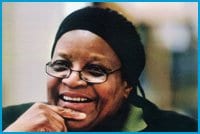Sherona. Sister, mother, friend. Dreadlocked feminist, activist. Fearless and unrelenting warrior. Yes, she was resilient — tough, too — but there was also a vulnerability that surfaced in rare and unexpected moments.
When I met Sherona in the early 1970s she was already a seasoned and tireless political worker. At age 15 in Jamaica she had left her mark as a campaigner and organizer and was a founding member of the youth wing of the People’s National Party (PNP). In Canada she continued her work on behalf of the PNP and the socialist movement led by Michael Manley from the late 1960s through the 1980s. She gave money and housed and fed many a PNP candidate who came calling on Jamaicans living in Toronto. In recognition of Sherona’s love of and commitment to the people of Jamaica, another old comrade, recently elected Jamaican Prime Minister Portia Simpson, sent her condolences.
We worked together in the late 1970s through an organization Sherona founded, the Committee Against The Deportation Of Immigrant Women (CADIW), set up to advocate for landed status for seven Jamaican-born domestic workers in Toronto who were facing deportation. Although Sherona didn’t hesitate to work with male-led groups working on behalf of the women, she was convinced that a women’s organization could most effectively address many of the issues.
Over the years, Sherona touched many lives. She had only to see the need to act, whether it be with the Black Action Defence Committee, labour struggles, the International Women’s Day Committee, feminist organizations, HIV and AIDS groups or lesbian, gay, bisexual and trans groups. She also gave of her time and money to African Heritage Month and to Kwanza celebrations, particularly in St James Town but in other communities as well. She was passionate about the well-being of young people. Just before her death she worked as a community youth advocate with the Toronto Housing Authority.
Sherona worked both inside and outside the system. Her work as a court reporter in Toronto brought her insight into the legal system and its problematic relationship with young black men. In 2004 she worked with other community advocates from the Malvern area and St James Town to expunge the records of many young black men who had been charged with petty crimes and still had records years later, which meant they could not get jobs. Every Friday evening she met with these young men to make them knowledgeable about the law and their legal rights. I hope that young people remember her fight on their behalf.
We shared many journeys together, political and personal. Sherona’s immense pride and belief in her Jamaican community of East Kingston, her capacity to see beyond its grinding poverty, her determination that injustice could be fought, shaped her radical politics. Sometimes over a drink or a pot of fish tea soup, Sherona would reminisce about her father’s wooden shop with its earth floor, which supplied the community with goods from ground provisions and rice to flour and coconut oil.
As mothers we shared the joy and pride we felt for our children along with the inherent contradictions activist mothers face and the lived messiness that comes with those contradictions. Many years later, with the death of her mother, father and then her sister, she regretted not having spent more time with her family. It was the price she paid for the political work that made her mother, sister and friend to entire communities, locally, nationally and internationally.
An extraordinary woman, Sherona made no apology for any of the many strands of her identity, nor for the diverse struggles she engaged in, nor for any seeming contradictions. If questioned, she would say that of course these strands would “somehow, somewhere create contradictions in our everyday lives. Ah just earth runnings.” We need to draw on Sherona’s capacity for putting personal “isms” aside so that justice is the goal.
Never afraid to chant down Babylon by herself, she oftentimes ignored her fatigue until her health was compromised by stress. Even when pushed to the margins by the very groups that relied on her, she remained unshakeable, had already taken the high ground, would fight for her convictions no matter the cost. Finally, like the many before her on whose backs we continue to climb on, she succumbed.
Her greatest unrealized ambition was to write her life story, to set down her struggles and her growth as a political person, and to talk about the price of being a woman in what were often male-dominated political organizations. But, like many other radical women, she put the telling of her story aside for the “right time,” for after the work was done. Maybe one day we will honour her wish with a biography.
To you, Ruddy, this is what I think your mother would like you to hear: “Grieve not, nor speak of me with tears, but laugh and talk of me as if I were beside you.” And then she would say, “I love you.”
For the rest of us who knew her, I am reminded of a Jewish proverb that goes something like this: “Speak not in grief that she is no more, but live in thankfulness that she was.”

 Why you can trust Xtra
Why you can trust Xtra


